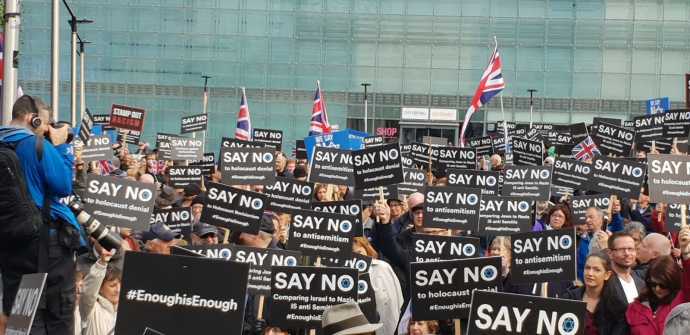The UK has an extremely well-developed infrastructure of anti-Israel campaign groups, notably the well-organized Palestine Solidarity Campaign (PSC), which is capable of mass mobilizations on the street and online and has most UK trade unions as formal affiliates. In addition to the PSC, a far smaller, more extreme group called Palestine Action pursues illegal "direct-action" tactics, such as physical damage to the local premises of Israeli defense company Elbit.
The anti-Israel politics associated with the PSC reached the peak of its political power when its long-term patron, Jeremy Corbyn, unexpectedly became leader of Labour, Britain's main opposition party. While Corbyn didn't shift Labour's policy stance on Israel very far, his victory emboldened a very anti-Israel culture in the party (most visibly when the party conference hall was a sea of Palestinian flags), and this morphed into an antisemitism crisis for the party, where Jewish members were confronted by widespread antisemitic discourse both online and in party meetings.
This could have signaled the start of a downward spiral for the debates about Israel and antisemitism in the UK.
In fact, it provoked a remarkable fight back by the Jewish Community, which numbers just 0.5% of the population, and its allies.
The 2018 "Enough is Enough" protest, called by the Board of Deputies of British Jews and the Jewish Leadership Council, put public pressure on Labour, which led to it adopting the IHRA definition of antisemitism so that there was now clarity about which anti-Zionist discourse was also antisemitic.

The Jewish Labour Movement (a grouping inside the party reinvigorated by thousands of new, often young, members) and Campaign Against Antisemitism escalated the issue by submitting huge dossiers of evidence to the Equality and Humans Rights Commission (the UK's equalities watchdog), which led by 2020 to Labour being found to have committed unlawful acts by discriminating against, harassing, and victimizing its Jewish members.
By this stage, Corbyn's extremism had already been decisively rejected by the electorate in the 2019 General Election, and Labour had turned the corner by electing a new, moderate leader, Keir Starmer, committed to using the party's disciplinary processes to root out antisemitism.
Labour is now unrecognizable from the party it was under Corbyn. Large numbers of antisemites and their apologists have been expelled from membership, and many other Corbyn supporters have quit the party and been replaced by new members. The Corbynites are now a marginal force inside the party, which opinion polls suggest will form the next government. Labour's traditionally balanced, two-state position towards Israel and the Palestinians and opposition to BDS has been restored.
The self-confidence generated in the Jewish community and wider pro-Israel camp by winning this existential battle has inspired the confidence to push for other policy victories and push the PSC and its allies back to the margins.
A traditionally ambiguous government stance towards designating terrorist groups as such has been challenged, with the political wings of Hamas and Hezbollah now proscribed, and an ongoing battle to get the Islamic Revolutionary Guard Corps (IRGC) banned as well.
Now, a government-sponsored bill is progressing through Parliament to ban local councils and other public bodies from supporting boycotts or divestment, protecting one of the areas of civil society that the PSC had been keen to target.
Between 2015 and 2019, the UK showed how deep into mainstream politics extreme, antisemitic, anti-Zionism can seep. This looked like the culmination of decades of patient work by anti-Israel activists across civil society, in unions, the Labour Party, and other left parties, on campus, in some churches, in the arts and cultural sector, and in local government.
Now, the UK has shown that this tide can be reversed by grassroots political mobilization by the Jewish community and its allies, both within the center-left and across the wider political spectrum.
The battle continues, but the bleak picture of the Corbyn years is gone.
Luke Akehurst is the Director of We Believe in Israel, a UK-based pro-Israel advocacy coalition, with over 25,000 supporters of Israel. Mr. Akehurst is also an elected member of the Labour Party National Executive Committee.
This op-ed is published in partnership with a coalition of organizations that fight antisemitism across the world. Read the previous article by Angel Mas.
